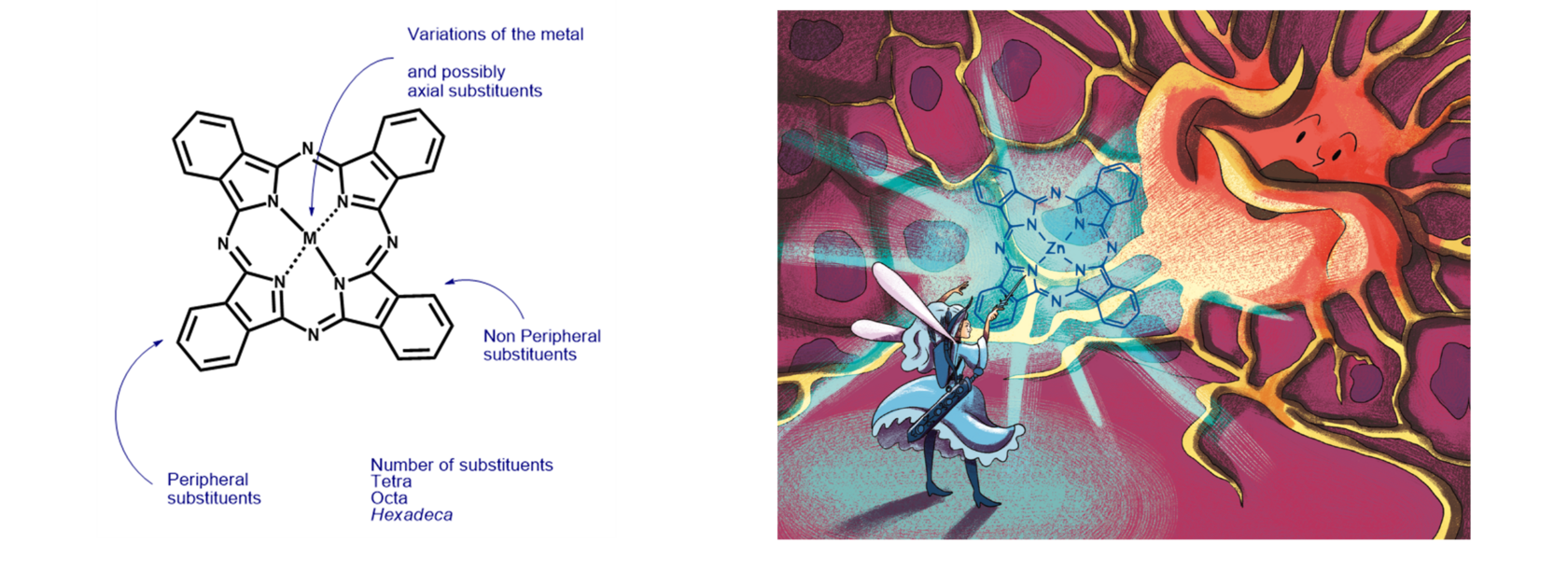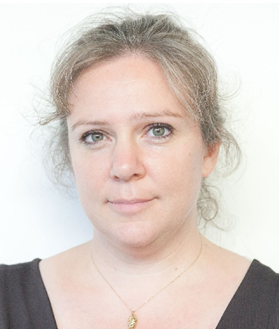The Chemistry Seminar at NU will continue with the research lecture on
"Designing Phthalocyanines for Biomedical Triplet Photo-applications"
by our guest speaker Dr Fabienne DUMOULIN Acıbadem Mehmet Ali Aydınlar University, Faculty of Engineering and Natural Sciences, Department of Biomedical Engineering, Istanbul, Türkiye.
Date: 16 February 2024, 18.00 Astana time
Biographical Information
Assoc. Prof. Dr. Fabienne Dumoulin studied first biology, graduated in biochemistry then completed her PhD with a European Label in organic chemistry in Lyon, France in 2002. After a post-doc in Pisa, Italy, she settled in Türkiye in 2005 and is now a faculty of the Department of Biomedical Engineering of Acıbadem Mehmet Ali Aydınlar University since 2020. She is an internationally recognized expert on the design and synthesis of tetrapyrrolic derivatives, mainly phthalocyanines for photodynamic therapy. She authored so far 95+ research articles, three book chapters and supervised a dozen of Master and PhD students. She has been awarded several Young Scientist Awards: TUBA-GEBİP from the Turkish Academy of Sciences, BAGEP from the Bilim Akademisi and the Mustafa N Parlar Foundation of METU. She is one of the Turkish national nodes for the International Day of Light, was elected officer of the executive committee of the European Society for Photobiology in 2015 and 2017 and is a Member of the Royal Society of Chemistry, and she regularly organises the photodynamic day in Istanbul. Fabienne Dumoulin is also an associate editor and editorial board member for RSC Advances and the Journal of Porphyrins and Phthalocyanines. She has co-edited the book series “Porphyrin Science by Women” published in January 2021 and strongly advocate for the recognition of women in STEM.
Assoc. Prof. Dr. Fabienne Dumoulin studied first biology, graduated in biochemistry then completed her PhD with a European Label in organic chemistry in Lyon, France in 2002. After a post-doc in Pisa, Italy, she settled in Türkiye in 2005 and is now a faculty of the Department of Biomedical Engineering of Acıbadem Mehmet Ali Aydınlar University since 2020. She is an internationally recognized expert on the design and synthesis of tetrapyrrolic derivatives, mainly phthalocyanines for photodynamic therapy. She authored so far 95+ research articles, three book chapters and supervised a dozen of Master and PhD students. She has been awarded several Young Scientist Awards: TUBA-GEBİP from the Turkish Academy of Sciences, BAGEP from the Bilim Akademisi and the Mustafa N Parlar Foundation of METU. She is one of the Turkish national nodes for the International Day of Light, was elected officer of the executive committee of the European Society for Photobiology in 2015 and 2017 and is a Member of the Royal Society of Chemistry, and she regularly organises the photodynamic day in Istanbul. Fabienne Dumoulin is also an associate editor and editorial board member for RSC Advances and the Journal of Porphyrins and Phthalocyanines. She has co-edited the book series “Porphyrin Science by Women” published in January 2021 and strongly advocate for the recognition of women in STEM.
Abstract
Phthalocyanines are artificial porphyrinoids with a nearly infinite structural variety. Appropriately metaled phthalocyanines are excellent triplet photosensitisers that can be used in various photo-applications, especially for biomedical applications. Modulation of the phthalocyanines’ properties can be achieved by modifying the metalation and the substitution pattern.
Phthalocyanines are artificial porphyrinoids with a nearly infinite structural variety. Appropriately metaled phthalocyanines are excellent triplet photosensitisers that can be used in various photo-applications, especially for biomedical applications. Modulation of the phthalocyanines’ properties can be achieved by modifying the metalation and the substitution pattern.

Left: the nearly infinite possible structural variations on a phthalocyanine core.
Right: the power of phthalocyanines in anti-cancer photodynamic therapy (reproduced from Chem. Soc. Rev., 2020,49, 1041-1056).
Selected References
[1] Pui-Chi Lo, M. Salomé Rodriguez-Morgade, Dennis K. P. Ng*, Tomas Torres*, Ravindra Pandey* and Fabienne Dumoulin*, Chemical Society Reviews, 2020, 49, 1041-1056
[2] Eda Gazel Pehlivan, Yıldız Ek, Derya Topkaya, Uygar Halis Tazebay* and Fabienne Dumoulin*, J. Porphyrins Phthalocyanines 2019, 23, 1587-1591
[3] G. Ekineker, C. Nguyen, S. Bayir, S. Dominguez-Gil, U. Isci, M. Daurat, A. Godefroy, L. Raehm, C. Charnay, E. Oliviero, V. Ahsen, M. Gary-Bobo*, J.-O. Durand and F. Dumoulin* Chem. Commun. 2019, 55, 11619-11622
[4] H. Y. Cheah, E. Gallon, F. Dumoulin, S. Z. Hoe, N. Japundžić-Žigon, S. Glumac, H. B. Lee, P. Anand, L. Y. Chung, M. J. Vicent and L. V. Kiew, Mol. Pharmaceutics 2018, 15, 2594-2605
[5] M. Tarhouni, D. Durand, E. Önal, D. Aggad, Ü. İşci, G. Ekineker, F. Brégier, B. Jamoussi, V. Sol, M. Gary-Bobo and F. Dumoulin* J. Porphyrins Phthalocyanines 2018, 22, 552–561
[6] C. Mauriello-Jimenez, M. Henry, D. Aggad, L. Raehm, C. Charnay, X. Cattoen, M. Wong Chi Man, S. Alpugan, V. Ahsen, D. K. Tarakcı, P. Maillard, M. Maynadier, M. Garcia, F. Dumoulin*, M. Gary-Bobo*, J.-L. Coll, V. Josserand* and J.-O. Durand* Nanoscale, 2017, 9, 16622-16626.
[1] Pui-Chi Lo, M. Salomé Rodriguez-Morgade, Dennis K. P. Ng*, Tomas Torres*, Ravindra Pandey* and Fabienne Dumoulin*, Chemical Society Reviews, 2020, 49, 1041-1056
[2] Eda Gazel Pehlivan, Yıldız Ek, Derya Topkaya, Uygar Halis Tazebay* and Fabienne Dumoulin*, J. Porphyrins Phthalocyanines 2019, 23, 1587-1591
[3] G. Ekineker, C. Nguyen, S. Bayir, S. Dominguez-Gil, U. Isci, M. Daurat, A. Godefroy, L. Raehm, C. Charnay, E. Oliviero, V. Ahsen, M. Gary-Bobo*, J.-O. Durand and F. Dumoulin* Chem. Commun. 2019, 55, 11619-11622
[4] H. Y. Cheah, E. Gallon, F. Dumoulin, S. Z. Hoe, N. Japundžić-Žigon, S. Glumac, H. B. Lee, P. Anand, L. Y. Chung, M. J. Vicent and L. V. Kiew, Mol. Pharmaceutics 2018, 15, 2594-2605
[5] M. Tarhouni, D. Durand, E. Önal, D. Aggad, Ü. İşci, G. Ekineker, F. Brégier, B. Jamoussi, V. Sol, M. Gary-Bobo and F. Dumoulin* J. Porphyrins Phthalocyanines 2018, 22, 552–561
[6] C. Mauriello-Jimenez, M. Henry, D. Aggad, L. Raehm, C. Charnay, X. Cattoen, M. Wong Chi Man, S. Alpugan, V. Ahsen, D. K. Tarakcı, P. Maillard, M. Maynadier, M. Garcia, F. Dumoulin*, M. Gary-Bobo*, J.-L. Coll, V. Josserand* and J.-O. Durand* Nanoscale, 2017, 9, 16622-16626.
